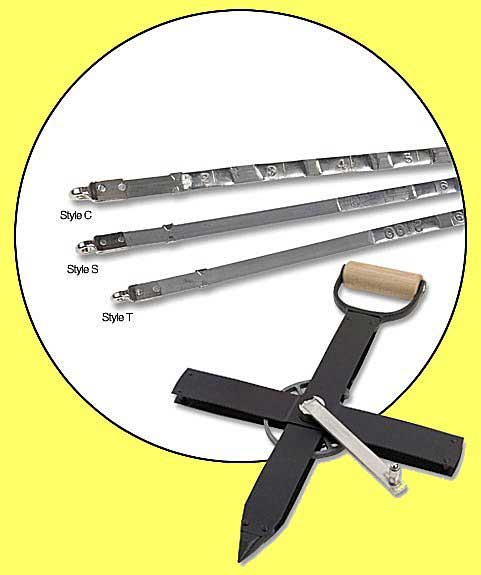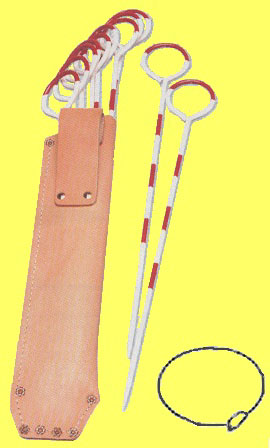.....200
foot Chains (or tapes) were used by the crews that measured the distance
between telephone poles or buried cable pedestals on the projects Vern
worked on in the 1950's and 60's. Then the measuring wheel came into being.
 .....Vern
can't remember which style he used, just that at every foot a blister was
welded to it with the number stamped into that blister. He dragged that
darn chain for 100's of miles around Michigan. At times the chain would
break at a kink or thin point due to ware. There was a repair kit which
consisted of a pre-folded piece of metal (sleeve) with solder in it. You
could place the broken ends into the sleeve and touch a match by it to
heat and solder it. This might work for a while. He had a shop West of
Hudson that used silver-solder that held much better.
.....Vern
can't remember which style he used, just that at every foot a blister was
welded to it with the number stamped into that blister. He dragged that
darn chain for 100's of miles around Michigan. At times the chain would
break at a kink or thin point due to ware. There was a repair kit which
consisted of a pre-folded piece of metal (sleeve) with solder in it. You
could place the broken ends into the sleeve and touch a match by it to
heat and solder it. This might work for a while. He had a shop West of
Hudson that used silver-solder that held much better.
.....While
walking down the roads or through fields, your mind wanders to different
thoughts and a tool was needed to keep track of how many feet you were
up to. This is where the chain pins come in. Vern had his pins on a ring,
he could have had the leather case.
.....Chaining
is a two person job, the guy pulling the chain has a set of pins,
(they
come in sets of 11) when the end of tape nears the starting
point the tail guy would yell out "chain one" and hold the 200 foot mark
on the starting point. If you didn't yell out the lead guys arm might be
pulled off. The lead guy sticks a pin in the ground to mark the 1st - 200
feet. and moves on until the tail guys stops him again and another pin
is placed. Here the tail guy collects the 1st pin.
..... |
 |
This
continues until a point is reached where another fixture of plant is required.
The tail guy moves up to the last pin in the ground, reads the footage, say
117', counts the number of pins he has, say 2, and the distance is added
up to 517 feet...... |

